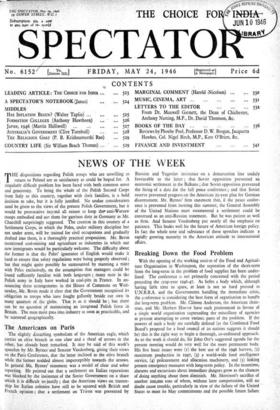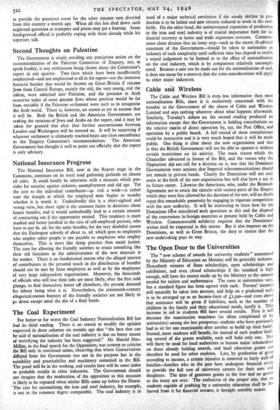Breaking Down the Food Problem
With the opening of the working session of the Food and Agricul- ture Organisation in Washington, the separation of the short-term from the long-term in the problem of food supplies has been under- lined. The conference is not primarily concerned with the period preceding the crop-year 1946-47. As befits a body which, although having little time to spare, at least is not so hard pressed as U.N.R.R.A. and the Governments handling the immediate crisis, the conference is considering the best form of organisation to handle the long-term problem. Mr. Clinton Anderson, the American chair- man, and Mr. Herbert Hoover have each pronounced in favour of a single world organisation superseding the miscellany of agencies at present attempting to cover various parts of the problem. If the powers of such a body are carefully defined (as the Combined Food Board's proposal for a food council of zo nations suggests it should be) this is the right way to begin a thorough, co-ordinated approach. As to the work it should do, Sir John Orr's suggested agenda for the present meeting would do very well for the more permanent body. His five basic issues were (I) the best use of the 1946 harvest, (2) maximum production in 1947, (3) a world-wide food intelligence service, (4) prOcurement and allocation machinery, and (5) linking present emergency measures with long-term policy. In the meantime, alarums and excursions about immediate dangers grow as the chances of doing anything about them diminish. Mr. Morrison's sacrifice of another 200,000 tons of wheat, without later compensation, will no doubt cause trouble, particularly in view of the failure of the United ' States to meet its May commitments and the possible future failure
to provide the promised cover for the other 200,000 tons diverted from this country a month ago. When all this has died down such neglected questions as transport and prices may get a hearing. Some hard-pressed official is probably coping with them already while his superiors talk.



























 Previous page
Previous page